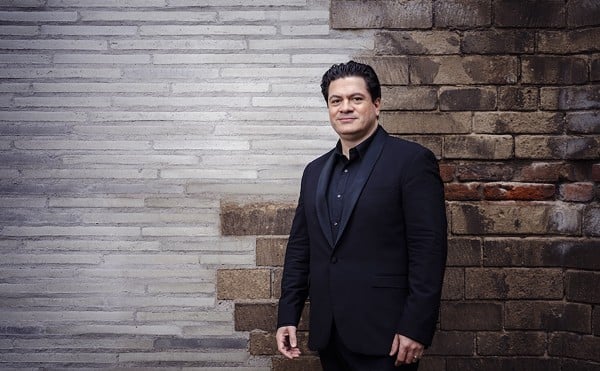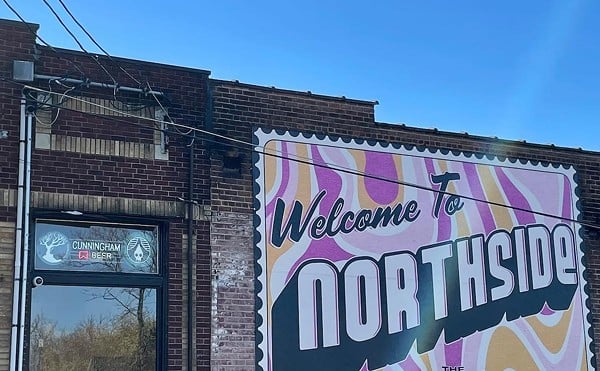|
Brian Jonestown Massacre with The Giant Judys
Wednesday · Southgate House
Make no mistake: Anton Newcombe is crazy. Not crazy like the life of the party but certifiably, classifiably white-coatable. Like most crazy people, he's out mingling with the merely neurotic among us because he poses no real danger to himself or others. Unlike most crazy people, his wobbly sanity is symptomatic of a deeper and more prevalent condition: artistic genius. For the past 13 years, Newcombe has explored the musical aspect of his psychic unraveling through his Rolling Stones (and whole '60s mélange) fixation within the context of his erratic but undeniably fascinating band, the Brian Jonestown Massacre. BJM's 1995 shoegazer epic, Methodrone, was a potent debut, but the band's four albums in 1996 showed Newcombe and BJM for all their flawed brilliance — the primitive revisiting of Spacegirl and Other Favorites, the psychedelic blurt of Their Satanic Majesties' Second Request, the straight ahead Take It From the Man! and the Country-tinged Blues of Thank God for Mental Illness. In the intervening years, Newcombe has become renowned for his antics outside of BJM as well: His legendary feud with The Dandy Warhols might have been more publicity than animosity but it made great Rock theater (exploited to great effect in the recent, multi-film-festival-prize-winning documentary, DIG!). Ultimately, though, Newcombe's turmoil has found him charting a wild course through numerous labels and dealing with an almost constant membership turnover. Since 1998's sole major label release of Strung Out in Heaven (on TVT), BJM has become increasingly cinematic in approach; Heaven's graphics even resembled a '70s blaxploitation classic. BJM's last two releases, 2000's EP Zero and 2001's full-length Bravery Repetition and Noise, both featured the band's patented lo-fi sonics with a distinctly more orchestrated atmosphere applied to its Psych Pop foundation.
Similarly, Newcombe and the latest incarnation of BJM concocted their latest epistle of sound with last year's ... And This is Our Music, a furtherance of BJM's current cinematic feel, combined with a veneer of '80s influences like Echo and the Bunnymen and The Church. A retrospective double disc is slated for release next month and the new We Are the Radio is due early next year. Anton Newcombe is one of those rare artists who can translate their tremulous emotional state into evocative art without drifting into deliberate and falsely manufactured melodrama. (Brian Baker)
Fred Eaglesmith
Thursday · Southgate House
Canadian singer/songwriter Fred Eaglesmith has plotted a fascinating course over his nearly quarter-century Country/Folk/Roots career. By the time he'd gotten a deal to release an album in the U.S., 1995's Drive-In Movie, Eaglesmith had already released four studio albums and a pair of live discs in the Great White North to a fair amount of cultish acclaim and success. Drive-In Movie cemented his reputation at home, securing Eaglesmith his first Juno award and padding his press kit. Down in the Lower 48, Drive-In Movie generated plenty of label buzz, which led to Eaglesmith's signing with indie Razor & Tie for Lipstick Lies and Gasoline, his eighth album but first to gain wide distribution in the U.S. After the release of Lipstick Lies, Eaglesmith toured with a vengeance, a trend he continued after the summer 1999 release of his much lauded 50 Odd Dollars. It's an astonishing testament to his perseverance, confidence and passion for his craft to realize that his first significant impact in this country came almost 20 years after his debut at home. Since the acclaim for 50 Odd Dollars, Eaglesmith has released a steady stream of equally well received albums (including the brilliant Falling Stars & Broken Hearts in 2002 and his incredible third live album, 2001's Ralph's Last Show) to an ever expanding group of cultists known as Fredheads. He's been given the ultimate hat-tip with the release of last year's tribute The Songs of Fred Eaglesmith, featuring Robbie Fulks, Jay Bennett, Slaid Cleves, Kasey Chambers and Gurf Morlix, among others. Eaglesmith's latest album, the Bluegrass-fueled Balin, is available only at shows and online, and his new album, Dusty, will be out within the next few weeks. Fredheads, start your engines. (BB)
Mosquitos with entheos
Thursday · Alchemize
Just as Tropicalia/Rock cult heroes Os Mutantes infused traditional Brazilian sound forms with the strong influence of the Zombies, Beatles and other new Rock records they heard at the time, the New York City-based trio Mosquitos swirl their AmerIndie Pop together with heavy doses of things like bossa nova and Brazilian Jazz to create a sound distinctly contemporary, yet somehow simultaneously very vintage. Comprised of Americans Chris Root (guitar and vocals) and keyboard/electro guy Jon Marshall Smith, plus Brazilian singer/dancer/actress Juju Stulbach, Mosquitos' serendipitous route to each other is as charming as their music. Root bumped into Stulbach incidentally, and they reveled in their shared love for Brazilian music, a passionate meeting-of-the-minds that led a backpacking Root to follow Stulbach back to Brazil to record some songs. Unable to finish before returning, Root happened to bump into Smith upon his re-entry into the States, and the two completed the works by adding some of Smith's organ playing onto the recordings. The band cemented by happenstance, their self-titled debut (released in 2003) received sparkling accolades from Rolling Stone's David Fricke, bubbling word-of-mouth from the Indie crowd and, most recently, a song on the television show The O.C., which seems to be more of an honor for a band than a Grammy at this point. With a breezy, sensuous sound that will appeal to fans of artists like Air, The Cardigans, Tahiti 80 and the underrated Ivy, Mosquitos' sophomore effort, Sunshine Barato (a mix of Portuguese and English that translates to "cheap sunshine") is a warm, luscious slab of aural exotica, led by the whispery, alluring vocals of Root and Stulbach, and supported with serene subtlety by delicate textures and Root's elegant, expressive guitar playing. The "Indie" part is almost inconsequential, though not being bound by any style leaves them open to throw in clever curve balls — the Who-like stampede of "The End ... ing" is particularly delectable. Quenching like a fruity but potent cocktail on a scorching hot afternoon, Mosquito's blissfully cool amalgamation of influence swells into something mysterious, sensual and hauntingly beautiful. (Mike Breen)





